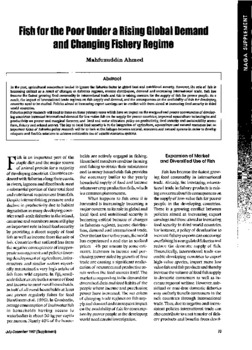Fish for the poor under a rising global demand and changing fishery regime
Abstract
In the past, agricultural researchers tended to ignore the fisheries factor in global food and nutritional security. However, the role of fish is becoming critical as a result of changes in fisheries regimes, income distribution, demand and increasing international trade. Fish has become the fastest growing food commodity in international trade and this is raising concern for the supply of fish for poorer people. As a result, the impact of international trade regimes on fish supply and demand, and the consequences on the availability of fish for developing countries need to be studied. Policies aimed at increasing export earnings are in conflict with those aimed at increasing food security in third world countries. Fisheries policy research will need to focus on three primary areas which have an impact on the marginal and poorer communities of developing countries: increased international demand for low-value fish on the supply of poorer countries; improved aquaculture technologies and productivity on poorer and marginal farmers; and land and water allocation policy on productivity, food security and sustainability across farm, fishery and related sectors. The key to local food security is in the integration of agriculture, aquaculture and natural resources but an important focus on fisheries policy research will be to look at the linkages between societal, economic and natural systems in order to develop adequate and flexible solutions to achieve sustainable use of aquatic resources systems

